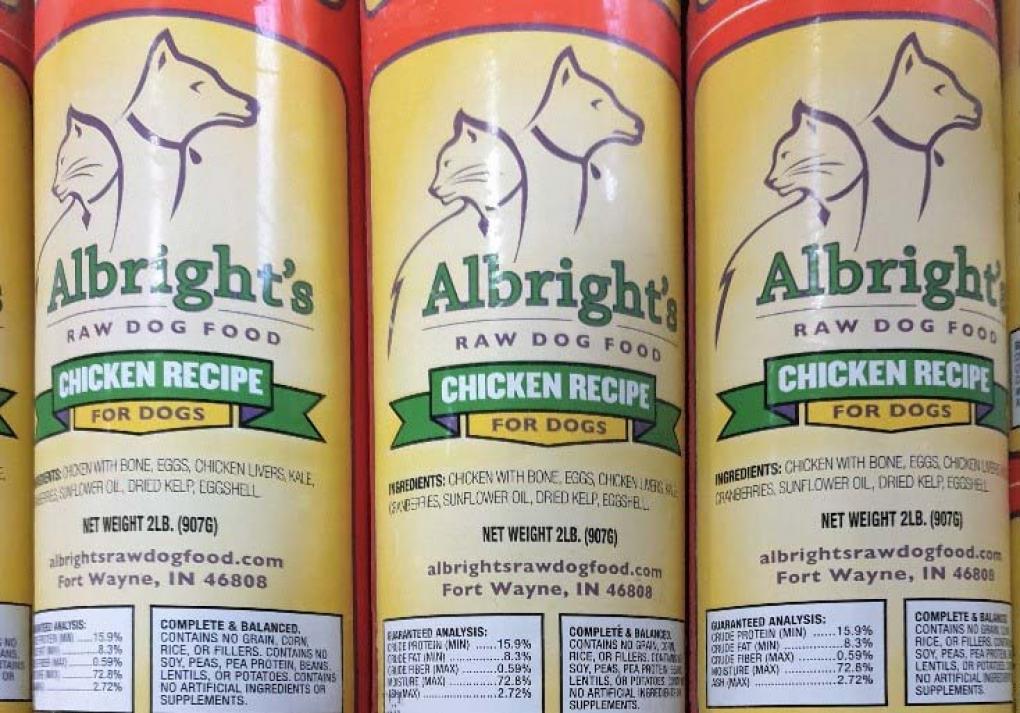Albright’s Raw Dog Food (Fort Wayne, IN) recalled 67 cases of Chicken Recipe for Dogs because it can be contaminated with Salmonella. The product was distributed in CA, FL, IL, IN, NH, NJ, NV, NY, PA, and TN through retail stores, mail order, and direct delivery. The product was sold frozen, distributed from the company to distributors from 7/8/20 to 8/27/20, and is packaged in 2 lbs chubs/rolls. One animal illness has been reported. No human illnesses have been reported to date. The problem was revealed after testing conducted by the FDA and was limited to a single batch. @ https://www.fda.gov/safety/recalls-market-withdrawals-safety-alerts/albrights-raw-dog-food-recalls-chicken-recipe-dogs-because-possible-salmonella-health-risk
Albright’s Raw Dog Food of Fort Wayne, IN is voluntarily recalling 67 cases of Chicken Recipe for Dogs because it has the potential to be contaminated with Salmonella. Salmonella can affect animals eating the products and there is risk to humans from handling contaminated pet products, especially if
ruth
A microbiological testing found that MONIQUE RANOU brand La gourmande duck gizzard salad was contaminated with Listeria. The product has been recalled from the market. @ https://kswfoodmicro.com/2020/11/13/france-product-recall-monique-ranou-brand-la-gourmande-duck-gizzard-salad-listeria-monocytogenes/
Oulah ENCOUNTERED PROBLEM Presence of Listeria PROPOSED SOLUTION Those in possession of this product are asked not to consume it and to return it to the point of sale where it was purchased. People…
ruth
The Food Safety and Inspection Service (FSIS) reported a summary of foodborne illness associated with FSIS-regulated products. During FY 2017, FSIS investigated eight outbreaks that involved approximately 300 illnesses and over 100 hospitalizations. Of the eight outbreaks investigated, Salmonella (75.0%) was the most common pathogen, followed by STEC (12.5%) and Lm (12.5%). Among the six Salmonella outbreaks, beef, chicken, and pork products were associated with illnesses. There were two additional outbreaks investigated during FY 2017, one each caused by STEC and Lm. Available evidence did not implicate FSIS-regulated products as the source of illnesses in these outbreaks. During FY 2018, FSIS investigated 16 outbreaks that involved approximately 1,400 illnesses and more than 400 hospitalizations. Ten (62.5%) outbreaks involved illnesses in more than one state. Of the 16 outbreaks, Salmonella (56.3%) was the most common pathogen, followed by STEC (31.3%), Clostridium, Salmonella, and Lm (6.3%). During FY 2019, FSIS investigated 16 outbreaks that involved approximately 1,000 illnesses and more than 175 hospitalizations. Of the 16 outbreaks investigated, Salmonella (43.8%) was the most common pathogen, followed by STEC (37.5%) and Lm (18.8 %). @ https://www.fsis.usda.gov/wps/portal/fsis/topics/data-collection-and-reports/fsis-data-analysis-and-reporting/data-reporting
FSIS data analyses and reports are divided into a number of core areas. These core areas are described and links to representative reports are provided.
ruth
The FDA reported that by November 9, 2020, 12 people from six states (CA (2), IL (4), MI (2), OH (1), PA (2), and VA (1)) were infected with the outbreak strain of E. coli O157:H7. Of 11 ill people with information available, five have been hospitalized. No deaths have been reported. The strain of E. coli found in the Michigan sample is a third distinct strain not genetically related to the strains causing two distinct multi-state outbreaks of Shiga-toxin producing E. coli O157:H7 (STEC) that FDA and CDC announced on October 28, 2020. There is not enough epidemiologic and traceback information available at this time to determine if ill people got sick from eating Tanimura & Antle romaine lettuce. @ https://www.fda.gov/food/outbreaks-foodborne-illness/outbreak-investigation-e-coli-o157h7-unknown-food-fall-2020?utm_medium=email&utm_source=govdelivery
Romaine sample from Michigan tests positive for E. coli, potentially linked to illnesses




